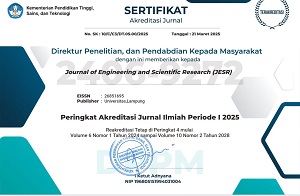Effect of Added Pectin and Microcrystalline Cellulose (MCC) on Capsule Shell Quality
DOI:
https://doi.org/10.23960/jesr.v3i2.64 - Abstract View: 538Keywords:
Pectin, Microcrystalline Cellulose (MCC) , Capsule ShellAbstract
The objective of this study was analyzing the effect of the added pectin and microcrystalline cellulose (mcc) on the capsule shell quality. The method used in this study was by combining the pectin and microcrystalline cellulose composition on capsule shell manufacture. The formulation used to test the capsule shells was through 1 gram, 2 gram, 3 gram of pectin; 0 gram and 1.5 gram of microcrystalline cellulose; 1 gram of glycerol; and, 1 gram of carrageenan. The experiment tests used in this study were through the organoleptic test, the capsule weight test, the moisture test, the pH test, the dissolution time test, and the capsule-length test. The result of this study showed that the recommended formulation used to manufacture the hard capsule shells was through 3 gram pectin and 1.5 gram microcrystalline cellulose. The required temperature to heat the pectin and microcrystalline cellulose was at 90oC with 2.5-hour heating time. The characteristics of the manufactured capsule shells were that it had a turbid colour and irregular shape, the surface was not smooth and the disintegration time was 9 minutes and 21 seconds.
Keywords: Capsule Shell, Microcrystalline Cellulose, Pectin, Variation, Testing
Downloads







